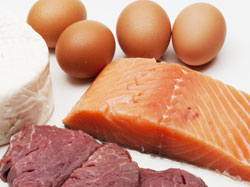
We all know that we need protein to build muscle, which is what we are all about here at VPX. The question is - how much protein is too much protein? There’s been numerous studies looking at this one particular topic, but our aim here is to be efficient at the amount that we take in and not waste those expensive protein powders/shakes if we don’t have to.
There are many types of protein, but in this write up, we’ll look at the main two so you can get a basic understanding. None of these proteins are better than the other, but they do have their benefits in their own specific way.
Let’s start off with Casein protein – you can find this type of protein in almost any VPX protein powders, but more specifically in Protein Rush, Power Hit Protein Shots, and Stealth. Casein is the predominant phosphoprotein that accounts for nearly 80% of proteins in cow’s milk and cheese. Casein protein is a rich protein that takes longer for the body to break down. Since it takes longer for the body to break down this protein, it lasts much longer in the body than whey protein does. Casein is emptied from the stomach more slowly than whey proteins, so casein is considered a “slow” protein. Casein produces a greater leucine balance in the body due to its digestive properties.
Now onto Whey, this is probably the most common form of protein ingested by weight lifters because it is the most readily available at nearly any supplement counter. All of VPX’s protein powders/drinks contain some form of whey, but Syngex is a pure whey protein concoction. Whey protein is the collection of globular proteins isolated from whey, a by-product of cheese manufactured from cow's milk. Whey is left over when milk coagulates, and contains everything that is soluble from milk. Whey protein is a supplemental protein source often used by athletes; particularly those aiming to gain muscle mass. Whey is essential in the bodybuilding world today because of its ability to be digested very rapidly. This allows the protein to become available for muscle building very quickly. Most commonly it is used after workouts to help increase levels of amino acids in the blood, which is taken up by the muscles to ultimately increase mass. In addition, during exercise, whey helps open up blood flow by inhibiting an angiotensin-converting enzyme; an enzyme which originally constricts blood vessels, and allows better flow of nutrients to necessary areas to help repair and rebuild muscle tissues. Whey protein supports greater net muscle mass gains with resistance exercise. Whey proteins are a rich source of essential amino acids and rapidly elevate plasma amino acids, thus providing the foundations for preservation of muscle mass.
Now that you know the basics, we can talk about how much protein you actually might need. This is a subject that vastly varies between each individual. The RDA for protein in healthy adults is 0.8 g/kg body weight per day. This amount of protein intake may be appropriate for non-exercising individuals, but it is likely not sufficient to offset the oxidation of protein/amino acids during exercise nor is it sufficient to provide substrate for lean tissue accretion or for the repair of exercise induced muscle damage. Protein intakes of 1.4-2.0 g/kg/day for physically active individuals are not only safe, but may improve the training adaptations to exercise training.
So depending on the time of day, your work out, and body mass, you need to vary the amount of protein you take in. To boil it down – Casein absorbs slowly and is better taken throughout the day whereas Whey absorbs rapidly and is better taking before, during or post work out. You need to vary your intake depending upon your body’s specific needs.
References
- Tipton, K., Elliott, T., Cree, M., Wolf, S., Sanford, A., & Wolfe, R. (2004). Ingestion of casein and whey proteins result in muscle anabolism after resistance exercise. Medicine And Science In Sports And Exercise, 36(12), 2073-2081. Retrieved from MEDLINE database.
- Boirie, Y., Dangin, M., Gachon, P., Vasson, MP., MauBoIs, A.,Beaufrere, B.,. Slow and fast dietary proteins differently modulate postprandial protein accretion. Proc. Nal. Acad. Sci.USA 94:14930-14935, 1997.
- Tang, J., Manolakos, J., Kujbida, G., Lysecki, P., Moore, D., & Phillips, S. (2007). Minimal whey protein with carbohydrate stimulates muscle protein synthesis following resistance exercise in trained young men. Applied Physiology, Nutrition, And Metabolism = Physiologie Appliquée, Nutrition Et Métabolisme, 32(6), 1132-1138. Retrieved from MEDLINE database.
- Balch, P.,. James F., Prescription for Nutritional Healing, 3rd edition. New York: Avery Publishing, 2000, 80-1.
- Kimball S.,; Jefferson, LS., (2006). "Signaling Pathways and Molecular Mechanisms through which Branched-Chain Amino Acids Mediate Translational Control of Protein Synthesis". Journal of Nutrition 136 (1): 227S.
- Phillips, S., Tang, J., & Moore, D. (2009). The role of milk- and soy-based protein in support of muscle protein synthesis and muscle protein accretion in young and elderly persons. Journal Of The American College Of Nutrition, 28(4), 343-354. Retrieved from MEDLINE database.
- Hayes, A., & Cribb, P. (2008). Effect of whey protein isolate on strength, body composition and muscle hypertrophy during resistance training. Current Opinion In Clinical Nutrition And Metabolic Care, 11(1), 40-44. Retrieved from MEDLINE database.
- Institue of Medicine of the National Academies: Dietary reference intakes for energy, carbohydrate, fiber, fat, fatty acids, cholesterol, protein, and amino acids (macronutrients). Washington, DC, National Academies press; 2002
- Tarnopolsky, M. Protein requirements for endurance athletes. Nutrition 2004, 20(7-8):662-668.
- Campbell B, Kreider RB, Ziegenfuss T, La Bounty P, Roberts M, Burke D, Landis J, Lopez H, Antonio J
- Journal of the International Society of Sports Nutrition 2007, 4:8 (26 September 2007)






